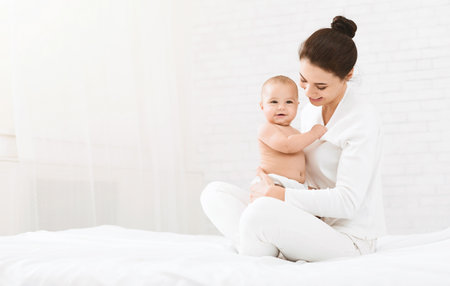Introduction to Nappies for Newborns
Choosing the right nappy for your newborn is one of the first important decisions you’ll make as a parent. For families across the UK, this choice can impact not only your baby’s comfort and skin health, but also your daily routine, budget, and environmental footprint. With so many options available, it’s essential to understand the differences between cloth and disposable nappies, as well as what might best suit your family’s lifestyle. British parents may also need to consider factors such as local recycling schemes, childcare preferences, and the unpredictable British weather when drying reusable nappies. In this guide, we’ll explore key considerations—including cost, convenience, sustainability, and baby’s wellbeing—to help you make an informed decision tailored to your unique needs.
Understanding Cloth Nappies
Cloth nappies have come a long way from the traditional terry squares that many parents in the UK may recall. Today, modern cloth nappies are designed to be user-friendly, highly absorbent, and gentle on your newborn’s delicate skin. The main types of cloth nappies available include all-in-ones, pocket nappies, two-part systems, and flat or pre-fold nappies. Each type offers its own unique benefits and practical considerations for new parents.
Types of Modern Cloth Nappies Available in the UK
| Type | Description | Key Features |
|---|---|---|
| All-in-One (AIO) | Single-piece nappy with absorbent layer sewn in | Easy to use; quick changes; less bulk |
| Pocket Nappy | Nappy with a pocket for insertable absorbent pads | Customisable absorbency; dries faster; flexible options |
| Two-Part System | Separate waterproof cover and absorbent inner nappy | Excellent leak protection; suitable for overnight use |
| Flat/Pre-fold Nappy | Flat piece of fabric folded to fit, secured with fasteners or pins and covered by a waterproof wrap | Economical; quick drying; adaptable sizing |
How Cloth Nappies Work for Newborns
Modern cloth nappies are designed to be as straightforward as possible. For newborns, it’s important to choose nappies that offer a snug fit around tiny legs and waists to prevent leaks. Many brands in the UK provide ‘newborn’ or ‘size 1’ options specifically tailored for smaller babies. Most cloth nappies fasten with either poppers or Velcro for ease and adjustability as your baby grows.
Practical Aspects of Using Cloth Nappies with Newborns
Using cloth nappies involves a few additional steps compared to disposables. After changing your baby, soiled nappies are typically stored in a lidded bucket or wet bag until wash day. Most cloth nappies can be washed at 40–60°C using non-bio detergent, which is recommended for sensitive newborn skin. With modern designs, liners (either reusable or disposable) can help catch solids and make cleaning easier. While initial investment costs are higher, cloth nappies can save money over time and reduce household waste—a factor many environmentally-conscious UK families consider.
![]()
3. Understanding Disposable Nappies
Disposable nappies are a popular choice among UK parents due to their convenience and ease of use, especially during the early newborn stage. These nappies are made from absorbent materials such as super-absorbent polymers and soft inner linings, designed to keep your babys skin dry and comfortable. Unlike cloth nappies, disposables are single-use items that can be thrown away after each change, which is particularly helpful for busy families or those without access to frequent laundry facilities.
Popular British Brands
When choosing disposable nappies in the UK, you will find several trusted brands on the market. Some of the most widely available include:
| Brand | Main Features | Where to Buy |
|---|---|---|
| Pampers | Highly absorbent core, wetness indicator, gentle on skin | Supermarkets, Boots, Amazon UK |
| Aldi Mamia | Affordable, dermatologically tested, award-winning performance | Aldi stores nationwide |
| Sainsbury’s Little Ones | Budget-friendly, sensitive options available, eco-conscious range | Sainsbury’s supermarkets |
| Eco by Naty | Environmentally friendly materials, plant-based layers, chemical-free | Online, health food shops, selected supermarkets |
How Disposable Nappies Differ from Cloth Options
The primary difference between disposable and cloth nappies lies in their design and usage. While cloth nappies are reusable and require regular washing, disposable versions offer a one-time-use solution. This means less time spent on laundry but more ongoing expense and increased waste sent to landfill. Disposables are generally more convenient for travel or when out and about; however, some parents prefer cloth options for environmental reasons or to minimise exposure to chemicals.
Key Factors to Consider for Newborn Use:
- Absorbency: Disposable nappies are engineered for high absorbency, ideal for the frequent wetting of newborns.
- Skin Sensitivity: Look for hypoallergenic or fragrance-free varieties if your baby has sensitive skin.
- Size and Fit: Choose a size specifically for newborns (“Newborn” or “Size 0/1”) to ensure comfort and leak protection.
- Cost: While disposables may seem cheaper initially due to lower upfront costs, the expense adds up over months of continuous use.
- Environmental Impact: Some brands offer eco-friendly alternatives with biodegradable components or sustainable packaging.
Nursing Tip:
If you notice any redness or irritation on your baby’s skin, try switching brands or opting for nappies labelled as suitable for sensitive skin. Always change nappies frequently—every 2–3 hours during the day—to maintain healthy skin integrity.
4. Pros and Cons of Cloth Nappies
When considering cloth nappies for your newborn in the UK, its important to weigh both their advantages and disadvantages. Below is a detailed analysis covering cost, environmental impact, skin health, and care routines, helping you make an informed decision that suits your family’s lifestyle.
Advantages of Cloth Nappies
- Cost-Effective in the Long Run: While the initial investment in cloth nappies may be higher, they can be reused for several years and even across multiple children, offering significant savings over time compared to disposables.
- Environmentally Friendly: Cloth nappies generate less landfill waste since they are reusable. Many parents choose them to reduce their household’s environmental footprint—an increasingly popular choice in eco-conscious UK communities.
- Gentle on Baby’s Skin: Made from natural fibres like cotton or bamboo, cloth nappies tend to be softer and less likely to cause nappy rash or irritation compared to some disposables containing chemicals or fragrances.
- Variety and Customisation: Cloth nappies come in various styles (such as all-in-ones or pocket nappies) and fun prints, allowing parents to choose what best suits their baby’s needs and personality.
Disadvantages of Cloth Nappies
- Laundry Requirements: Cloth nappies require regular washing—typically every two to three days—which can add to household chores. This is a crucial consideration for busy UK families or those with limited access to washing facilities.
- Upfront Costs: The initial outlay for a full set of cloth nappies can be considerable, although local councils in some parts of the UK offer incentive schemes or vouchers to help offset this expense.
- Bulkier Fit: Cloth nappies are generally bulkier than disposables, which may affect how certain clothes fit your baby.
- Absorbency and Leaks: Cloth nappies may need more frequent changing than high-absorbency disposable options, particularly overnight, and there can be a learning curve in finding the right fit to prevent leaks.
Cloth Nappies: Pros and Cons at a Glance
| Pros | Cons | |
|---|---|---|
| Cost | Savings over time; reusable for future siblings | Higher initial purchase cost |
| Environment | Less landfill waste; sustainable materials available | Laundry increases water and energy use |
| Skin Health | No harsh chemicals; soft natural fabrics | If not changed frequently, moisture retention may cause irritation |
| Care Routine | No need to purchase weekly; customisable absorbency | Regular washing required; more effort than single-use options |
UK-Specific Considerations for Cloth Nappies
- The UK has a growing network of nappy libraries where parents can trial different cloth nappy types before committing to a purchase.
- Council-run nappy incentive schemes may provide discounts or starter packs—check your local authority’s website for details.
- The British climate means drying times can vary seasonally. Many parents use indoor airers or heated drying racks during colder months.
Conclusion: Is Cloth Right For Your Family?
If you’re committed to sustainability, prepared for extra laundry duties, and keen on long-term savings, cloth nappies are an excellent choice. However, it’s essential to consider your daily routine and support network when deciding if this option suits your unique family situation in the UK context.
5. Pros and Cons of Disposable Nappies
Evaluation of Disposable Nappies for Newborns
When considering the best nappy option for your newborn, disposable nappies remain a popular choice across the UK. Below, we evaluate their benefits and drawbacks, taking into account convenience, environmental impact, expense, and how they fit into typical British family routines.
Advantages of Disposable Nappies
- Convenience: Disposable nappies are easy to use and change, making them ideal for busy parents or those on the go. They are readily available in supermarkets and chemists across the UK.
- Absorbency: These nappies are highly absorbent and effective at keeping your baby dry overnight, reducing the risk of nappy rash.
- No Washing Required: After use, you simply dispose of them—saving time and effort compared to washing cloth nappies.
- Travel-Friendly: Particularly useful during outings or holidays when laundry facilities may not be accessible.
Drawbacks of Disposable Nappies
- Environmental Impact: Disposables contribute significantly to landfill waste. In the UK, it’s estimated that around three billion disposable nappies are thrown away each year.
- Cost Over Time: Although convenient, disposables can be more expensive in the long run as you need to keep purchasing them regularly.
- Chemical Content: Some brands contain chemicals such as fragrances or gels which may irritate sensitive newborn skin, although many hypoallergenic options are now available.
- Storage of Used Nappies: You’ll need to manage odour and storage of soiled nappies until bin collection day, especially in urban flats with limited space.
Comparison Table: Pros and Cons of Disposable Nappies
| Aspect | Pro | Con |
|---|---|---|
| Convenience | Quick and easy to use; suitable for outings | N/A |
| Environmental Impact | N/A | Adds to landfill waste; not biodegradable |
| Expense | No upfront investment required; pay as you go | Cumulative cost higher over time |
| Household Routine Fit | Saves time; no extra washing needed | Bags of used nappies must be stored until rubbish collection day |
| Skin Sensitivity | Select hypoallergenic options available | Certain brands may irritate sensitive skin due to chemicals used in production |
6. Key Factors to Consider When Choosing Nappies
Selecting the right nappy for your newborn is a personal decision, influenced by your unique lifestyle, budget, environmental values, and your baby’s individual needs. Here’s a practical guide tailored for UK families to help you weigh up your options:
Lifestyle and Convenience
If you have a busy schedule or limited laundry facilities, disposable nappies may offer greater convenience. They are quick to change and dispose of, making them ideal for travel or when out and about. In contrast, cloth nappies require regular washing and drying, which may be manageable if you are at home more often or have access to reliable laundry services.
Budget Considerations
| Nappy Type | Initial Cost | Ongoing Cost | Long-term Savings |
|---|---|---|---|
| Cloth Nappies | Higher (starter kits £100–£300) | Low (mainly washing costs) | Significant (especially for multiple children) |
| Disposable Nappies | Lower (£5–£10 per pack) | High (continuous purchase) | Minimal (cost adds up over time) |
While cloth nappies require a higher upfront investment, they can save money in the long run. Disposables may seem cheaper initially but can become costly over several years.
Environmental Values
Many UK parents are increasingly mindful of their ecological footprint. Cloth nappies can significantly reduce landfill waste; however, their environmental benefit depends on efficient washing practices (full loads, lower temperatures). Some UK councils offer incentives for reusable nappies. Conversely, some disposable brands now offer eco-friendly options made from sustainable materials and produced with reduced carbon footprints.
Your Newborn’s Needs
- Sensitive skin: Cloth nappies made from natural fibres may be gentler on delicate skin. If using disposables, look for hypoallergenic and fragrance-free varieties.
- Fit and absorbency: Newborns need frequent changes. Check for adjustable sizing or extra absorbency features suitable for tiny babies.
- Nappy rash prevention: Both types require prompt changing after soiling to keep skin healthy.
Nappy Type Comparison: At a Glance
| Cloth Nappies | Disposable Nappies | |
|---|---|---|
| Lifestyle Fit | Better if at home; requires washing facilities | Best for travel & convenience; easy disposal |
| Cost Over Time | Saves money long-term | Cumulative cost increases over months/years |
| Eco Impact | Reduces landfill; energy used in washing/drying | Adds to landfill; eco-brands available in UK shops |
| Sensitivity & Comfort | Natural fabrics available; breathable options | Sensitive-skin lines available; ultra-absorbent types common in UK supermarkets/pharmacies |
Your Decision-Making Checklist:
- How much time do you have for laundry?
- Is initial cost or long-term saving more important?
- Are you seeking ways to minimise household waste?
- Does your baby have sensitive skin?
- Will you need to change nappies frequently while out and about?
- Are there local council incentives or support schemes available?
The right nappy choice is different for every family. Reflect on what matters most to you—whether it’s simplicity, savings, sustainability, or comfort—so you can select the nappy option that best fits your family’s needs here in the UK.
7. Conclusion and Advice for New Parents
Choosing the right nappy for your newborn is a significant decision, as it impacts your baby’s comfort, your daily routine, and even your household budget. Both cloth and disposable nappies come with their own set of benefits and challenges. To help you make an informed and confident choice, here’s a summary of the main points discussed in this guide:
| Nappy Type | Pros | Cons |
|---|---|---|
| Cloth Nappies |
|
|
| Disposable Nappies |
|
|
Practical Tips for New Parents in the UK:
- Try Before You Commit: Many brands offer sample packs; try both types before buying in bulk.
- Consider Your Lifestyle: If you’re often on-the-go or have limited access to laundry facilities, disposables might be more practical.
- Sensitive Skin? If your baby is prone to rashes, opt for cloth or hypoallergenic disposable nappies.
- Maternity Services Support: NHS health visitors can offer advice on nappy choices and skin care for newborns.
- Budget Wisely: While cloth nappies require a higher upfront cost, they save money over time—look out for local council schemes that sometimes offer discounts on reusable nappies.
- Sustainability Matters: If you prefer disposables but want to reduce environmental impact, look for biodegradable options stocked by UK retailers.
Your Decision is Unique to Your Family’s Needs
No single option suits every family. It’s perfectly normal to use a combination—many UK parents use cloth at home and disposables when out. Whichever path you choose, prioritise your baby’s comfort and your own peace of mind. Trust your instincts, ask fellow mums and dads for recommendations, and don’t hesitate to seek guidance from your midwife or health visitor. With time, you’ll find what works best for you and your little one.


